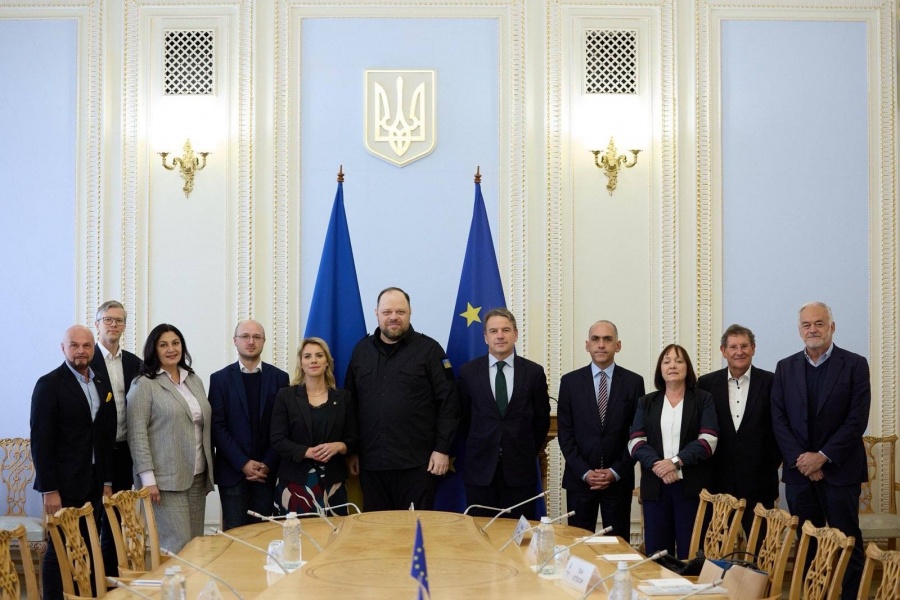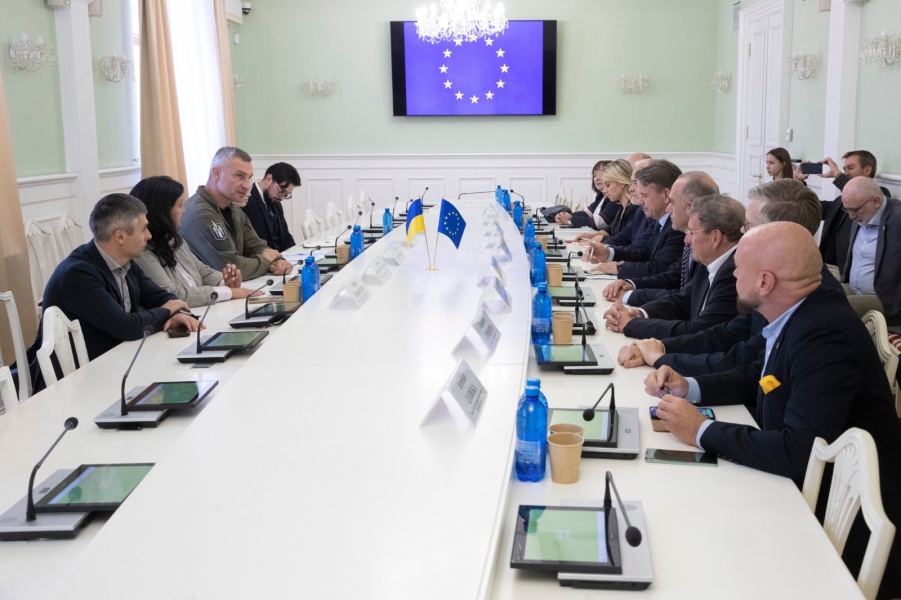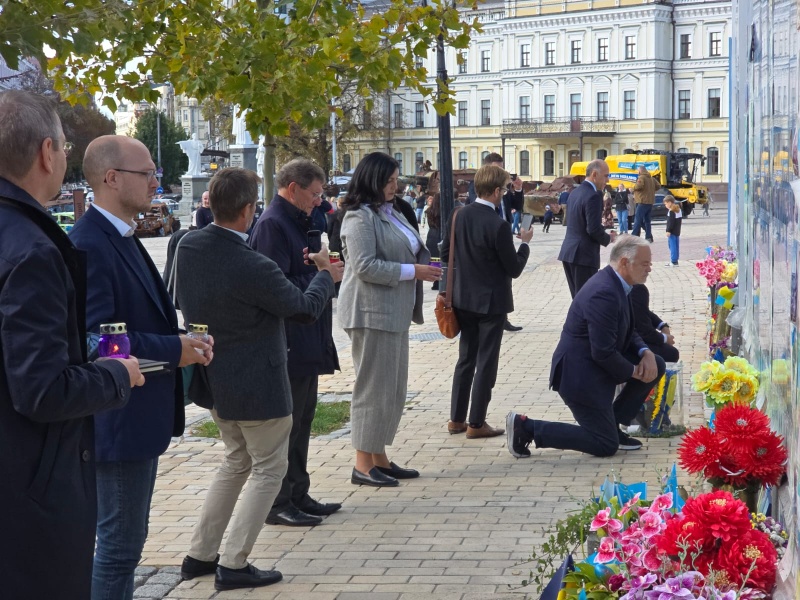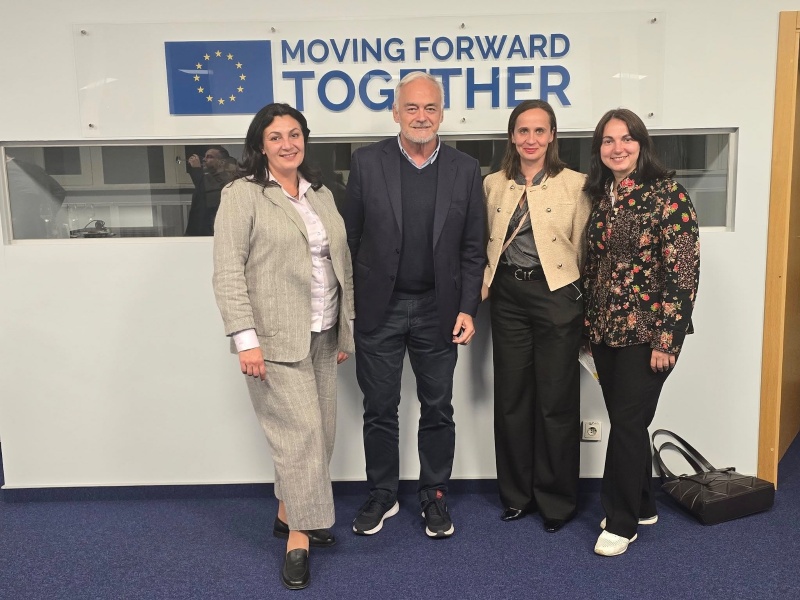During Their Visit to Ukraine, the COSAC Delegation Discussed Military Assistance and European Integration with Ukrainian Officials
29 September 2025, 11:00

At the invitation of Ivanna Klympush-Tsintsadze, Chair of the Verkhovna Rada Committee on Ukraine’s Integration into the EU, a COSAC delegation — the platform for cooperation among EU member states’ parliamentary committees on European affairs — arrived in Kyiv. This marks only the second time in COSAC’s history that a delegation has travelled outside the European Union, and for the second time, it was to Ukraine at the invitation of the Committee Chair.
On the first day of the visit, European parliamentarians paid tribute to those who lost their lives as a result of Russia’s war. They held a series of meetings with Verkhovna Rada Chair Ruslan Stefanchuk, First Deputy Chair Oleksandr Korniyenko, members of the Committee on Ukraine’s Integration into the EU representing various factions, Kyiv Mayor Vitali Klytschko, Deputy Prime Minister for European and Euro-Atlantic Integration Taras Kachka, Deputy Minister of Defence Hanna Hvozdiar, Deputy Minister for Foreign Affairs Yevhen Perebyinis, Deputy Head of the Office of the President Ihor Zhovkva, as well as representatives of anti-corruption institutions and civil society organizations.

The key topics of discussion included Ukraine’s military support, particularly through the SAFE (Security Action for Europe) mechanism — a new EU defence initiative adopted in May this year, which opens opportunities for Ukraine’s full integration into the European defence industrial complex. They also discussed the PURL mechanism — a U.S. and NATO initiative to accelerate the delivery of weapons to Ukraine, ensuring a steady supply of arms and air defence systems. Considerable attention was given to investments in Ukraine’s defence industry, especially following the Danish model, which not only provides Ukraine with weapons in the short term but also contributes to the long-term strengthening of its defence capacity.
Special focus was devoted to Ukraine’s European integration path. During meetings with the Speaker of the Verkhovna Rada, his First Deputy, the Deputy Prime Minister for European and Euro-Atlantic Integration, and the Deputy Minister for Foreign Affairs, participants discussed the need to open the first negotiation cluster with the EU — “Fundamentals.” They expressed hope that the European side will manage to overcome Hungary’s veto and that negotiations under this cluster will be launched by the end of this year, during Denmark’s Presidency of the Council of the EU. Deputy Prime Minister Taras Kachka informed participants about Ukraine’s efforts to establish a substantive and constructive bilateral dialogue with Hungary.

The COSAC members, in turn, stressed that reforms in Ukraine are an integral part of its European integration process. In particular, they underlined that the country’s ability to meet the Copenhagen criteria — the rule of law, effective anti-corruption efforts, and the protection of human rights and freedoms — is essential. They emphasized the importance of Ukraine sending a clear signal that the reform process is irreversible. EU member states, for their part, expressed readiness to help Ukraine work towards achieving full compatibility with EU member countries and succeed on its path to European integration.

During the meeting with the leadership of the Verkhovna Rada, participants also discussed issues of historical justice — in particular, the recognition of the Holodomor and the 1944 deportation of the Crimean Tatars as genocide. They also addressed preparations for the 4th Parliamentary Summit of the International Crimea Platform.
Ivanna Klympush-Tsintsadze, Chair of the Committee on Ukraine’s Integration into the EU, believes that this second visit of the COSAC delegation to Ukraine has been an important step toward deepening cooperation and mobilizing additional support for Ukraine among EU member states. Most importantly, it allowed the heads of parliamentary committees from across the EU to see with their own eyes what is happening in Ukraine and to realize that the security and future of Europe directly depend on Ukraine’s resilience.
On the first day of the visit, European parliamentarians paid tribute to those who lost their lives as a result of Russia’s war. They held a series of meetings with Verkhovna Rada Chair Ruslan Stefanchuk, First Deputy Chair Oleksandr Korniyenko, members of the Committee on Ukraine’s Integration into the EU representing various factions, Kyiv Mayor Vitali Klytschko, Deputy Prime Minister for European and Euro-Atlantic Integration Taras Kachka, Deputy Minister of Defence Hanna Hvozdiar, Deputy Minister for Foreign Affairs Yevhen Perebyinis, Deputy Head of the Office of the President Ihor Zhovkva, as well as representatives of anti-corruption institutions and civil society organizations.

The key topics of discussion included Ukraine’s military support, particularly through the SAFE (Security Action for Europe) mechanism — a new EU defence initiative adopted in May this year, which opens opportunities for Ukraine’s full integration into the European defence industrial complex. They also discussed the PURL mechanism — a U.S. and NATO initiative to accelerate the delivery of weapons to Ukraine, ensuring a steady supply of arms and air defence systems. Considerable attention was given to investments in Ukraine’s defence industry, especially following the Danish model, which not only provides Ukraine with weapons in the short term but also contributes to the long-term strengthening of its defence capacity.
Special focus was devoted to Ukraine’s European integration path. During meetings with the Speaker of the Verkhovna Rada, his First Deputy, the Deputy Prime Minister for European and Euro-Atlantic Integration, and the Deputy Minister for Foreign Affairs, participants discussed the need to open the first negotiation cluster with the EU — “Fundamentals.” They expressed hope that the European side will manage to overcome Hungary’s veto and that negotiations under this cluster will be launched by the end of this year, during Denmark’s Presidency of the Council of the EU. Deputy Prime Minister Taras Kachka informed participants about Ukraine’s efforts to establish a substantive and constructive bilateral dialogue with Hungary.

The COSAC members, in turn, stressed that reforms in Ukraine are an integral part of its European integration process. In particular, they underlined that the country’s ability to meet the Copenhagen criteria — the rule of law, effective anti-corruption efforts, and the protection of human rights and freedoms — is essential. They emphasized the importance of Ukraine sending a clear signal that the reform process is irreversible. EU member states, for their part, expressed readiness to help Ukraine work towards achieving full compatibility with EU member countries and succeed on its path to European integration.

During the meeting with the leadership of the Verkhovna Rada, participants also discussed issues of historical justice — in particular, the recognition of the Holodomor and the 1944 deportation of the Crimean Tatars as genocide. They also addressed preparations for the 4th Parliamentary Summit of the International Crimea Platform.
Ivanna Klympush-Tsintsadze, Chair of the Committee on Ukraine’s Integration into the EU, believes that this second visit of the COSAC delegation to Ukraine has been an important step toward deepening cooperation and mobilizing additional support for Ukraine among EU member states. Most importantly, it allowed the heads of parliamentary committees from across the EU to see with their own eyes what is happening in Ukraine and to realize that the security and future of Europe directly depend on Ukraine’s resilience.